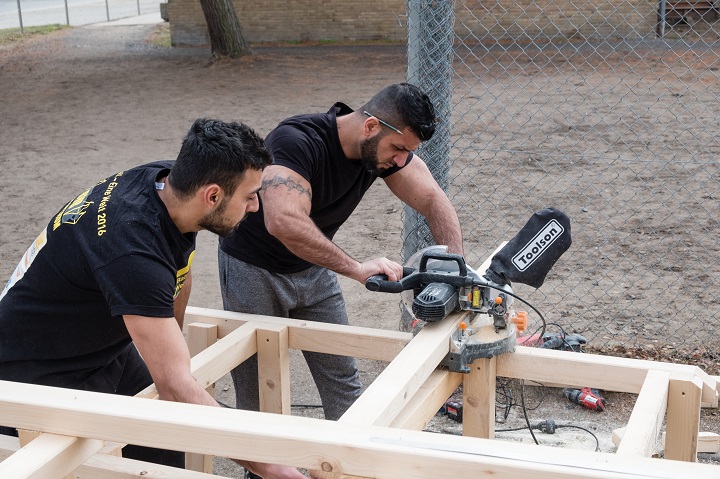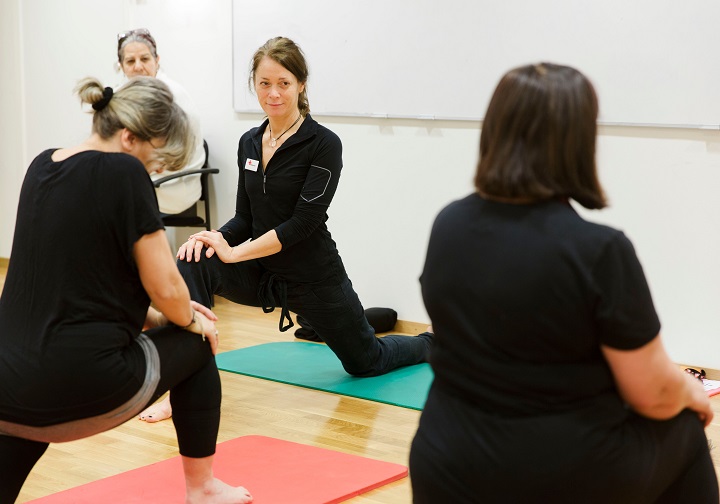Challenges & opportunities for the social inclusion of migrants in the EU
On 27 February, the Red Cross EU Office held a conference at the European Economic and Social Committee to discuss the current challenges and opportunities in supporting the social inclusion of migrants in the European Union (EU). In 2015, the EU saw over one million people reach its shores in search of safety and security. Many of these people will stay in the Union and contribute to the diversity of European society. During the conference, representatives from civil society and the EU institutions debated how participative and forward-looking migration and asylum programmes and policies can enhance the social inclusion prospects of migrants. The new Red Cross EU office booklet “Moving forward together: Red Cross approach to the social inclusion of migrants” was launched at the event.
Red Cross EU Office Migration Officer, Sabrina Le Noach presented the booklet, which showcases the multifaceted ways in which the Red Cross works with and for migrants in Europe. She underlined that social inclusion happens at the local level, stressing the value of working with local authorities and communities to cultivate a climate of mutual understanding, trust, and cooperation. Ms Le Noach also explained that an essential first step to enhancing the success of social inclusion measures is offering services that acknowledge and address the individual needs of each migrant.

Germany, 2017. © Brigitte Hiss / German Red Cross
Desislava Ivanova, Justice and Home Affairs (JHA) Counsellor for the 2018 Bulgarian Presidency of the Council of the EU highlighted the importance of boosting inclusion across all sectors. “There can be no sustainable migration without social inclusion measures” she said. Ms Ivanova emphasised the need to guarantee access for beneficiaries of international protection to key services, such as healthcare, education, and employment support. Mariana Stoyanova, Manager of the Refugee and Migrant Service at the Bulgarian Red Cross, added that these services should be made available in the early days following arrival, as they constitute an important investment for the future. Nonetheless, “social inclusion interventions remain relevant well beyond the arrival phase due to the long-term nature of the integration process”, she emphasised.
When it comes to the social inclusion of migrants in the EU, many of the challenges faced by migrants are not only societal but also legal. Indeed, legal status plays a significant role in determining access to many aspects of life that are fundamental for social inclusion, such as employment, healthcare, education and social services. With this in mind, Catherine Woollard, Secretary General of the European Council on Refugees and Exiles (ECRE), raised concerns about the current reform of the Common European Asylum System, and the proposed recast qualification regulation. She explained that the introduction of a compulsory review of international protection status risks jeopardising the integration chances of many people due to the instability it will create. She also stressed that integration and social inclusion measures should receive more financial support. “A minimum of 30% of the Asylum, Migration & Integration Fund (AMIF) should be allocated to integration”, she said.

© Ola Torkelsson / Swedish Red Cross
In parallel to these EU developments, several Member States are tightening their legislation on family reunification at the national level. By making it more difficult for separated families to be reunited, it is harder for migrants to settle down and envisage long term prospects in their new place of residence. “Family support can have a very positive impact on physical and mental health”, added Jillian McBride, Refugee Support Operations Manager for the British Red Cross in Scotland. She concluded by underlining how family reunification is key to removing some of the strain that impedes people from meaningfully engaging in the different aspects of their new life.
Director of the Red Cross EU Office, Denis Haveaux, closed the conference by urging the EU and its Member States to be bold in their support towards migrants, and continue their efforts to build more cohesion between the Union’s inhabitants.
Moving forward together: Red Cross approach to the social inclusion of migrants
“Moving Forward Together” looks at the ways the Red Cross works with and for migrants in Europe to raise awareness of inclusionary practices. With the aim of encouraging public authorities to increase their support for high-quality initiatives that facilitate the social inclusion of all migrants, this booklet provides 16 case studies that address a variety of angles, including healthcare, family unity, and access to employment.
A practitioner’s perspective
Like many other European Red Cross Societies, the Danish Red Cross is running a mixture of needs-oriented programmes to support the social inclusion of migrants in local communities. We spoke to Project Manager, Sira Støhrmann to learn more about the work that the Danish Red Cross is doing in this area.
For media inquiries, please contact Eva Oyón on: eva.oyon@redcross.eu or +32 2 235 09 22

